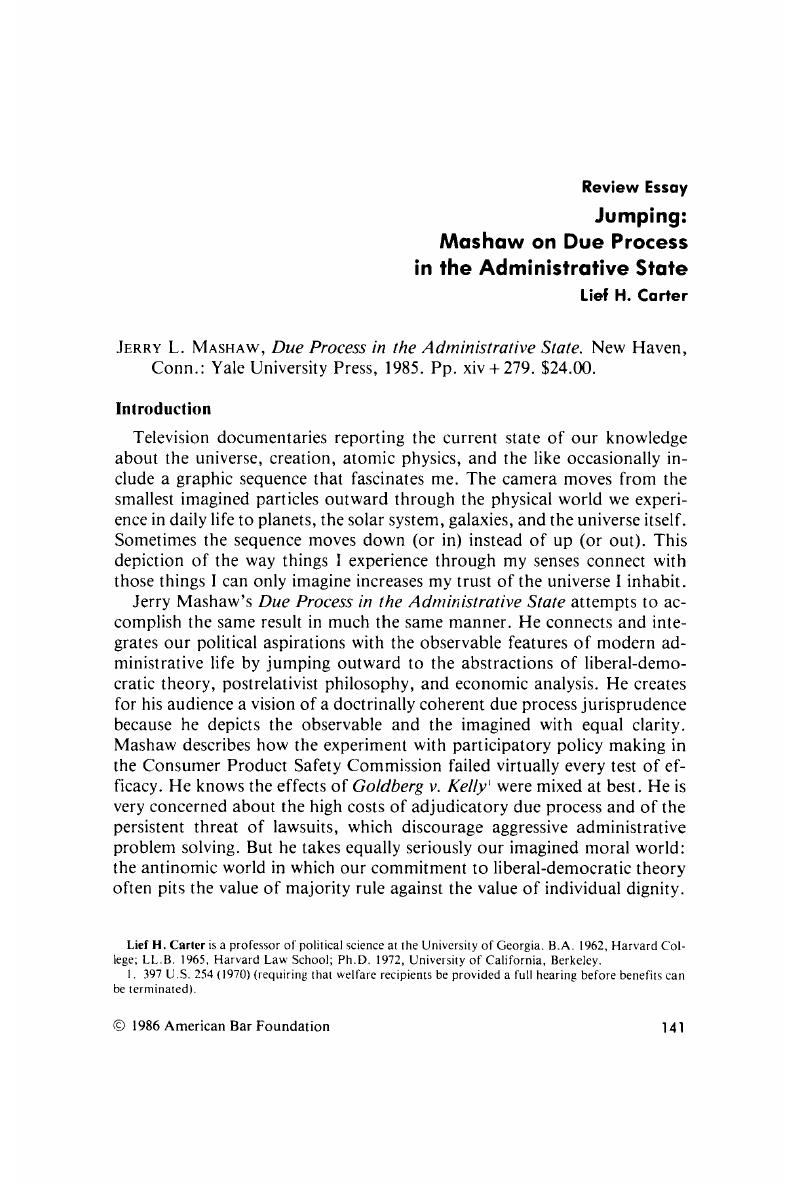No CrossRef data available.
Published online by Cambridge University Press: 20 November 2018

1 397 U.S. 254 (1970) (requiring that welfare recipients be provided a full hearing before benefits can be terminated).Google Scholar
2 The Yale University Press uses the legal profession's conventional citation system, which can perplex the uninitiated reader. Footnotes do appear at page bottom, and many greatly aid the argument. But more than a lew typos appear here and in the index. (Of all presses, Yale's should get the last letter of Judge Car-do/o's name right.).Google Scholar
3 435 U.S. 519 (1978).Google Scholar
4 424 U.S. 319 (1976).Google Scholar
5 402 U.S. 535 (1971).Google Scholar
6 405 U.S. 645 (1972).Google Scholar
7 447 U.S. 773 (1980).Google Scholar
8 408 U.S. 564 (1972).Google Scholar
9 239 U.S. 441 (1915).Google Scholar
10 410 U.S. 113 (1973).Google Scholar
11 517 P.2d 289 (1973).Google Scholar
12 Rules, Processes, and Interpretations, 1984 A.B.F. Res. J. 469, 478.Google Scholar
13 The Instruction of Ptahhotep (Fgyptian, 6th Dynasty, 2300–2150 B.C.).Google Scholar
14 See, e.g., Logan v. Zimmerman Brush Co., 455 U.S. 422 (1982).Google Scholar
15 Courts: A Comparative and Political Analysis (1981).Google Scholar
16 The Morality of Law 186 (1984).Google Scholar
17 Regents v. Ewing, 106 S. Ct. 507 (1985).Google Scholar
18 On February 12, 1986, a federal jury awarded Kemp $2,570,000.00 in actual and punitive damages. In April of 1986, Judge Horace Ward reduced the award to $680,000.00. A negotiated settlement of $1,080,000.00 was announced on May 5, 1986. Fred Davidson, president of the University of Georgia for 19 years, announced his resignation on March 13, 1986. Kemp v. Ervin and Trotter, Civil Action # C83-330A (N.D. Ga. May 5, 1986).Google Scholar
19 See works by Waller Murphy, Ronald Dworkin, Milner Ball, Jurgen Habermas, and much of the critical legal studies movement cited in my Contemporary Constitutional Lawmaking (1985).Google Scholar
20 See most recently Loren A. Smith, Judicialization: The Twilight of Administrative Law, 1985 Duke L.J.427.Google Scholar
21 See R. Shep Melnick, Regulation and the Couits (Brookings Institution, 1983).Google Scholar
22 The conversations recorded in Studs Terkel's Working (1974) frequently relate the experience of dignity to mutual confirmation of self-worth. Thus, when a customer says to a waitress.”‘you're great, how come you're Just a waitress‘?“’, she responds, “Just a waitress. I'd say ‘Why, don't you think you deserve to be served by me?' It's implying that he's not worthy, that I'm not worthy. It makes me irate” (at.191). I suggest that to the extent dignity is generated interactively, so that the citizen's dignity depends on a display of the decision maker's virtue, Mashaw's claim that rational comprehensibility confirms dignity is weakened.Google Scholar
23 My thanks to Professor Thomas Fisele and indirectly to Professor James Boyd White for reminding me of this truth.Google Scholar